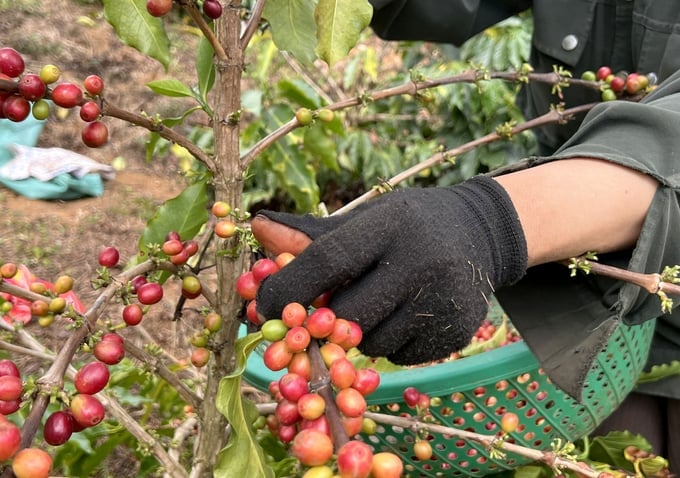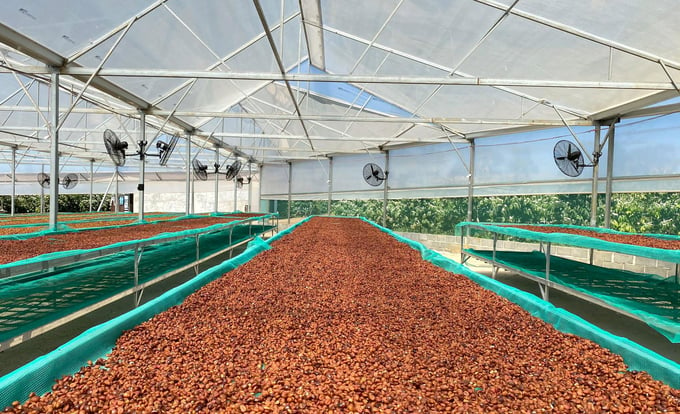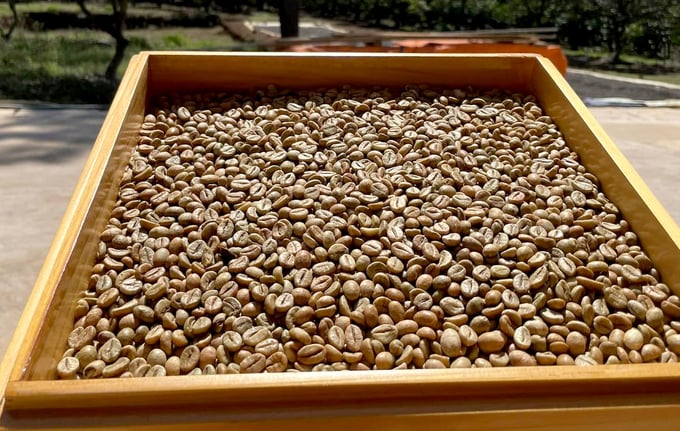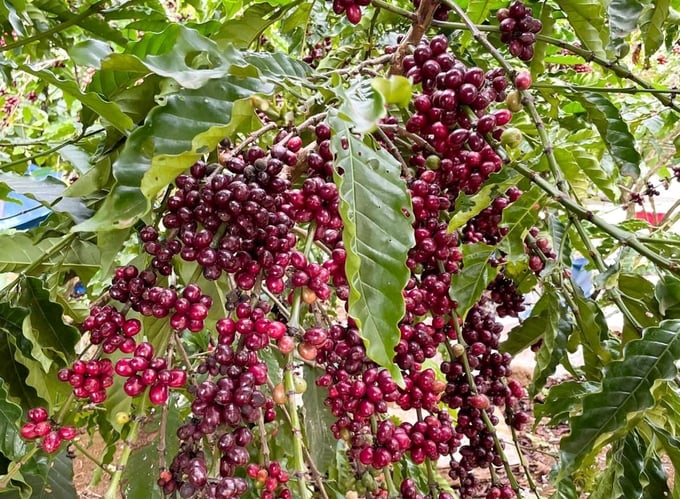May 20, 2025 | 08:30 GMT +7
May 20, 2025 | 08:30 GMT +7
Hotline: 0913.378.918
May 20, 2025 | 08:30 GMT +7
Hotline: 0913.378.918

Vietnam's coffee exports this year could exceed the USD 5 billion mark. Photo: Thanh Son.
Continuously following an upward trend since the beginning of the year, by the end of March, Vietnamese coffee prices had reached VND 100,000 per kg, an unprecedented price in the history of Vietnamese coffee. At the same time, Vietnam's Robusta coffee price is currently at the highest level globally, as predicted by Mr. Do Ha Nam, Chairman of the Board of Directors of Intimex Group.
The current coffee price is beyond the imagination of Vietnamese coffee farmers. Mr. Le Van Bao, a coffee farmer in Bu Dang district, Binh Phuoc province, shared that for decades since Vietnam exported coffee again, coffee growers have only dreamed of coffee prices reaching VND 50,000 per kg. Unexpectedly, in 2023, coffee prices exceeded this mark and went over VND 70,000 per kg. At the beginning of 2024, coffee prices increased sharply and reached VND 100,000 per kg, double farmers' expectations over the years.
Mr. Nam also said that the current coffee price is beyond the imagination of coffee businesses. Because coffee prices are not anticipated to reach this level, many companies need help buying coffee to fulfill export orders. Especially with export orders signed when Vietnamese coffee prices were still at VND 60,000 - 70,000 per kg, the possibility of losses for many exporters is enormous.
Not only domestic coffee prices but also Vietnam's export coffee prices increased sharply in the first months of this year. According to the General Department of Customs, in the first two months of the year, the average export price of Vietnamese coffee reached USD 3,146 per ton, an increase of 44.5% over the same period in 2023.
Mr. Nguyen Nam Hai, Chairman of the Vietnam Cocoa Coffee Association (Vicofa), said that in the first quarter of 2024, Vietnam is expected to export about 600,000 tons of coffee with a turnover of about USD 1.9 billion, an increase of 3 1% in export quantity but increased by 54.7% in export turnover. The export of green coffee is the primary source, accounting for about 91% of the output and about 85% of the value.
Vietnamese coffee prices increased in the first months of this year. Still, the supply has gradually depleted, and there is little inventory in warehouses for businesses and farmers, so export volume from now until the end of the season will decrease. The turnover potential will reach more than USD 5 billion in 2024.
Mr. Nguyen Quang Binh, a coffee market analyst, said that with the average export price at over USD 3,000 per ton and export value reaching USD 1.9 billion in the first three months of the year, coffee exports coffee this year could ultimately exceed the USD 5 billion mark.

Coffee is dried on a farm in the Central Highlands. Photo: Thanh Son.
A question being asked by many traders and experts in the Vietnamese coffee industry is whether, with the current high price of Vietnamese coffee, importers will switch to buying Robusta coffee in other markets or not.
Mr. Do Ha Nam said European importers buy Conilon (Brazilian robusta) to replace Vietnamese robusta coffee when processing instant coffee. However, consumers did not accept it. The reason is that although they are both robusta coffee, the flavor of Vietnamese products is very different from Conilon coffee.
Previously, Vietnamese robusta coffee was relatively cheap, so European companies prioritized its use and mixing when producing instant coffee. Over the decades, European consumers have become familiar with the flavor of Vietnamese Robusta coffee in instant coffee products. Therefore, if you want to replace Vietnamese robusta coffee with Conilon coffee, it will take a very long time.
Even Intimex Group once imported Conilon coffee to try mixing it into the instant coffee produced by the group. Still, it ruined the flavor of Vietnamese coffee and was not accepted by customers.
With the unique position of Vietnamese Robusta coffee, most of the world's leading coffee importers are currently in the Vietnamese market. Although many customers have recently complained about Vietnamese exporters delaying deliveries due to continuously rising prices, some importers have even threatened to switch to buying from other countries. However, they still need to purchase Vietnamese coffee.

It is very difficult to replace Vietnamese robusta coffee in Europe. Photo: Thanh Son.
In addition to market factors and reaching an export record of USD 5 billion, Vietnamese coffee also faces the issue of sustainable development in the current context.
Sustainable development for the coffee industry must first come from the production stage. When coffee prices were not high recently, the coffee area decreased significantly because farmers in many localities abandoned coffee to switch to durian, currently only about 660,000 hectares. Reduced area leads to reduced output, which will affect the position of Vietnamese coffee in the world market.
Mr. Le Thanh Tung, Deputy Director of the Department of Crop Production, said that over the years, the Vietnamese coffee industry has changed in varieties, production, and maintained coffee quality, etc., but that is not enough, it must be meeting quality standards, traceability, growing on deforested land. Only then can we meet the increasing demands of the domestic and world markets.

Vietnam's coffee output has been trending down recently. Photo: Thanh Son.
Therefore, Mr. Tung believes that the top solution is to help coffee farmers and coffee processing and exporting businesses achieve harmony between personal and national interests, thereby promoting value chain development for Vietnamese coffee beans.
Promoting processing and branding are essential to enhance Vietnamese coffee's value and sustainable development. Chairman of Vicofa said that Vietnam mainly exports green coffee (accounting for about 91% of coffee exports), and the remaining 9% are value-added products.
However, the low proportion of processed coffee in exports is a common problem for coffee-exporting countries, not just Vietnam. Brazil is the world's largest coffee producer but mainly exports green coffee (accounting for 88% of coffee exports).
According to Mr. Nguyen Nam Hai, in recent years, the rate of export turnover of instant coffee and deeply processed products has developed, and the rate has increased but is concentrated mainly in FDI enterprises. Among Vietnam's top 10 roasted, ground, and instant coffee exporters, only Trung Nguyen is a Vietnamese enterprise; the rest are FDI enterprises.
Translated by Tuan Huy

(VAN) On May 15, Ministry of Agriculture and Environment of Vietnam hosted the 'Connecting Vietnam - Germany agricultural, forestry and fishery trade' seminar in Berlin, Germany.

(VAN) In the face of counterfeit and imitation products, Khanh Hoa Salanganes Nest Company hopes for the prompt completion of the legal framework, strict enforcement against violations, and protection of the bird’s nest brand.

(VAN) Japan's efforts to lower the price of rice through the release of its stockpile may finally be making some progress, albeit at a snail's pace.

(VAN) U.S. tariffs are not only a 'shock', but also an opportunity for Vietnamese businesses to renew their mindset toward comprehensive development.

(VAN) As Bac Giang lychee enters the harvest season, Minister Do Duc Duy expects that the fruit will contribute greatly to agricultural exports due to standardized production and deep processing.

(VAN) Consumers have shown a preference for free-range eggs, but those farming systems are more vulnerable to biosecurity risks like bird flu.
/2025/05/09/5701-1-184335_301.jpg)
(VAN) Vietnam’s eel exports nearly doubled thanks to a mud-free farming model, opening up new prospects while still facing numerous barriers related to international standards.